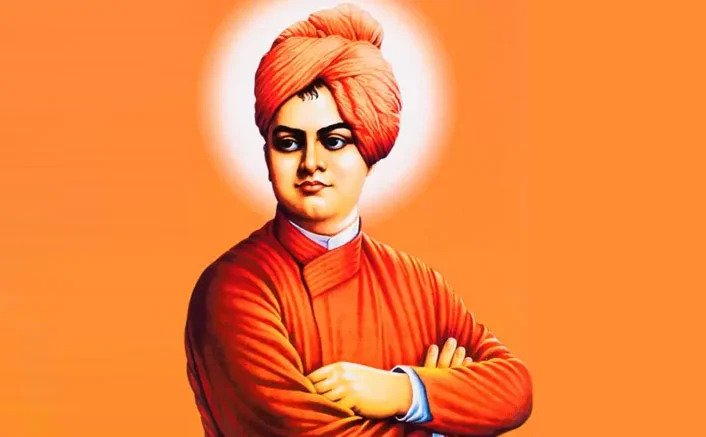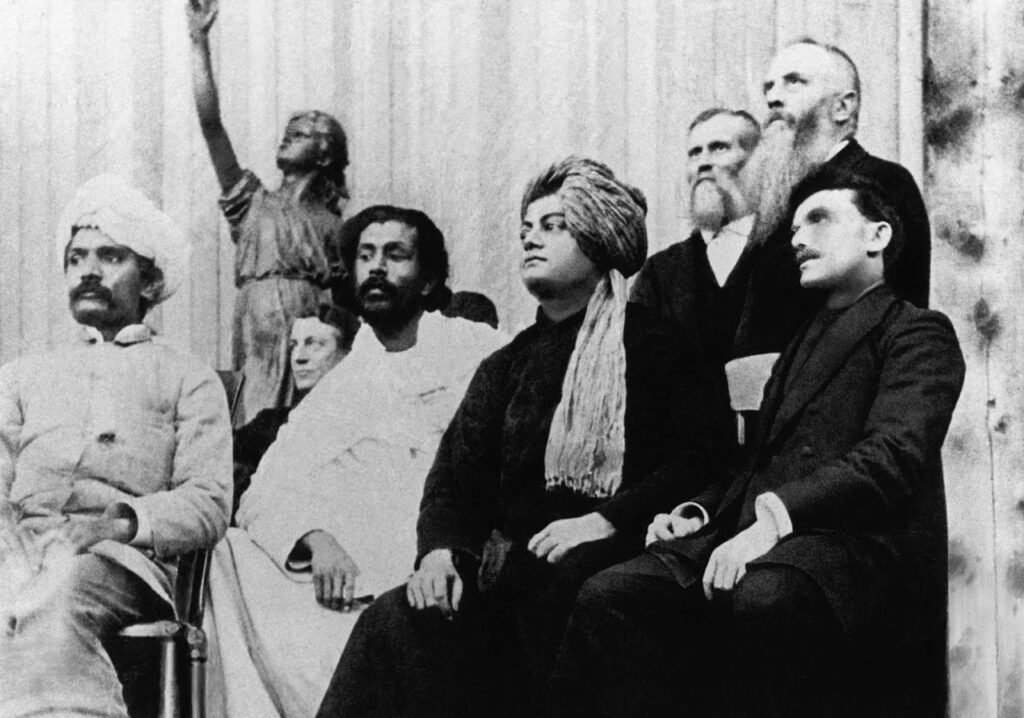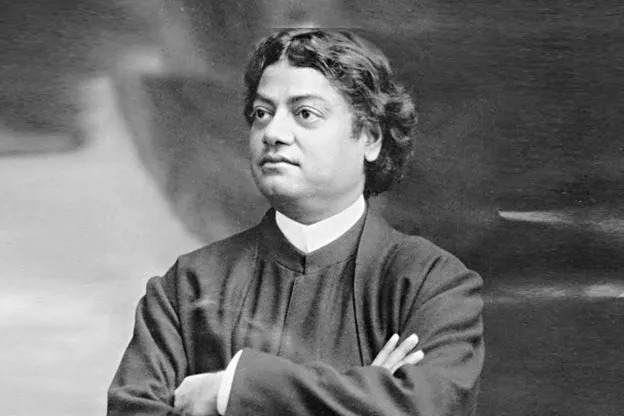Top 50 Fascinating and Lesser-Known Facts about Swami Vivekananda
Born in Kolkata, India, on January 12, 1863, as Narendranath Datta, Swami Vivekananda was a spiritual guide and philosopher whose teachings had a profound effect on India and the rest of the world. As a student of the Indian mystic Ramakrishna Paramahamsa, he is recognized for having introduced Indian spirituality to a worldwide audience.
Vivekananda is most recognized for his lecture before the Parliament of the World’s Religions in Chicago in 1893. His opening remarks, “Sisters and Brothers of America,” got him a two-minute standing ovation, and he went on to speak about the universal ideals of tolerance, harmony, and the oneness of all religions. He became known for his pivotal role in bringing yoga and Vedanta to the West thanks to this speech.

On July 4, 1902, Swami Vivekananda passed away at the age of 39, but millions of people are still motivated by his teachings. His teachings on self-realization, brotherhood among all people, and service to humanity are still applicable today, offering hope and inspiration to individuals who are looking for inner strength and direction.
Here’s a deep dive into 50 fascinating and lesser-known facts about Swami Vivekananda, presenting an exploration of his life, work, and enduring legacy.
1. Born in a Devout Family
Swami Vivekananda was born on January 12, 1863, in Kolkata (then Calcutta), to Vishwanath Datta, a successful attorney, and Bhuvaneshwari Devi, a deeply religious woman. His family’s devoutness shaped his spiritual upbringing.
2. Named by His Mother
His birth name was Narendranath Datta. His mother, Bhuvaneshwari Devi, named him after Lord Vishnu (Narendra means “Lord of Men”) as she believed that he was a blessing from the deity after her prayers.
3. Early Interest in Spirituality
From a very young age, Narendranath showed an interest in spirituality. His fascination with asceticism and renunciation began when he was still in his teens.
4. Influence of Ramakrishna Paramahamsa
At the age of 18, Narendranath met his spiritual guru, Ramakrishna Paramahamsa. This meeting proved to be transformative. Ramakrishna recognized Vivekananda’s spiritual potential and became his guide.
5. Challenged the Existence of God
Swami Vivekananda was initially a skeptic. He often challenged people about the existence of God. It was Ramakrishna who convinced him that God could be experienced through direct spiritual practice.
6. Proficient in Western Philosophy
Before his spiritual journey, Vivekananda was deeply influenced by Western philosophy. He studied the works of thinkers like John Stuart Mill, David Hume, and Immanuel Kant at the Scottish Church College in Calcutta.
7. Gifted Musician
Apart from his intellectual pursuits, Vivekananda was an accomplished musician. He was skilled in playing the pakhawaj (a traditional Indian drum) and also had a deep love for Indian classical music.
8. Meditated Under a Banyan Tree
During his spiritual search, Vivekananda spent long hours meditating under a banyan tree by the Ganga river. It is believed that it was during these meditation sessions that he gained profound insights into the nature of reality.
9. The Famous Chicago Speech
Swami Vivekananda’s fame skyrocketed after his speech at the Parliament of World’s Religions in Chicago on September 11, 1893. He began his speech with the words, “Sisters and Brothers of America,” which received a standing ovation from the audience.
10. Raised Awareness About Vedanta
Vivekananda is credited with spreading the teachings of Vedanta in the Western world. He emphasized that Vedanta is not only a philosophy but a way of life, meant to achieve unity, peace, and self-realization.
11. Suffered from Poor Health
Throughout his life, Vivekananda struggled with poor health. He suffered from asthma, diabetes, and insomnia. However, his dedication to his work never wavered despite these challenges.
12. Created the Ramakrishna Mission
In 1897, Vivekananda founded the Ramakrishna Mission, a humanitarian and spiritual organization named after his guru. The mission works in areas like education, health, and disaster relief, and it continues to thrive today.
13. Advocate of Women’s Empowerment
Long before feminism became a global movement, Vivekananda strongly advocated for women’s empowerment. He emphasized the role of women in society and stressed the importance of their education.
14. Introduced Yoga to the West
Swami Vivekananda was one of the first spiritual leaders to introduce the concept of yoga to the West. He explained yoga as a spiritual practice for attaining self-realization, not just a physical exercise.
15. A Man of Science
Vivekananda firmly believed that science and spirituality could coexist. He saw no conflict between the two and encouraged scientific inquiry alongside spiritual growth.
16. Traveled Across India as a Monk
Before traveling to the West, Swami Vivekananda wandered across India as a penniless monk. He traveled by foot, visiting different villages and learning about the condition of India’s people.
17. Vision for an Educated India
He had a strong vision for India’s education system. He emphasized the need for an education system that builds character and instills values, not just academic knowledge.

18. Philosophy of Practical Vedanta
Swami Vivekananda’s concept of Practical Vedanta is one of his most significant contributions. He believed that Vedanta should be applied to everyday life and used as a tool for social transformation.
19. Prophecy of His Death
Vivekananda often expressed a desire to live only for 39 years. His premonition turned out to be true, as he passed away at the young age of 39 on July 4, 1902.
20. Promoted Interfaith Dialogue
Long before it became popular, Vivekananda was a strong advocate of interfaith dialogue. He believed that all religions have a common goal and should work together for the welfare of humanity.
21. A Glimpse into His Writings
Swami Vivekananda’s prolific writings include books, essays, letters, and speeches. His works cover a wide array of subjects ranging from philosophy and religion to science and nationalism.
22. Strong Patriotism
Though primarily a spiritual leader, Vivekananda was deeply patriotic. He had a burning desire to see India rise and regain its past glory through self-reliance and self-respect.
23. Inspired by the Bhagavad Gita
The Bhagavad Gita had a profound influence on Swami Vivekananda’s life. He regarded it as a spiritual guide and often quoted its verses in his teachings.
24. Encouraged Youth to Build the Nation
Vivekananda placed great faith in the youth of India. He believed that young people had the power to transform society and called upon them to channel their energy into nation-building activities.
25. Icon of Indian Nationalism
Swami Vivekananda is regarded as one of the early proponents of Indian nationalism. His call for unity, self-reliance, and a resurgence of Indian culture played a pivotal role in shaping the national consciousness during the independence movement.
26. Lived a Life of Simplicity
Despite his fame, Swami Vivekananda lived a life of simplicity. His attire usually consisted of a saffron robe, and he practiced strict discipline in his personal life.
27. Meeting with Mahatma Gandhi
Mahatma Gandhi once remarked that it was the teachings of Vivekananda that inspired him to work for the upliftment of the poor and downtrodden in India.
28. Impact on Indian Independence Leaders
Many prominent leaders of India’s independence movement, including Subhas Chandra Bose, Jawaharlal Nehru, and Bal Gangadhar Tilak, were inspired by Swami Vivekananda’s philosophy.
29. Significance of the Belur Math
Swami Vivekananda established the Belur Math in 1899. It serves as the headquarters of the Ramakrishna Math and Mission and remains a center for spiritual learning and social service.
30. Fascination with the Himalayas
Swami Vivekananda had a lifelong fascination with the Himalayas. He visited the mountains several times during his spiritual journeys and considered them the ideal place for meditation.
31. Philosophy of Universal Brotherhood
Vivekananda’s vision of universal brotherhood transcended all boundaries of race, religion, and nationality. He often spoke about the essential oneness of all beings.
32. Influence on Western Thinkers
Swami Vivekananda left a lasting impact on many Western intellectuals and thinkers, including Nikola Tesla, who was inspired by Vivekananda’s teachings on Vedanta and the concept of energy.
33. Inspired Scientific Thought
Vivekananda was closely associated with several scientists of his time. His discussions with Nikola Tesla, particularly on energy and the relationship between matter and energy, were groundbreaking.
34. Did Not Advocate Blind Faith
Swami Vivekananda emphasized that religion should not be based on blind faith but on rationality, logic, and experience. He believed that one should question and explore religious beliefs rather than accept them unquestioningly.
35. A Poet at Heart
Vivekananda was also a gifted poet. His poetry reflected his deep spirituality, his love for India, and his longing for self-realization. Some of his notable poems include “Kali the Mother” and “The Cup.”
36. Influenced the Harlem Renaissance
Vivekananda’s teachings reached far beyond India. His ideas resonated with the intellectual and cultural movements in the United States, including the Harlem Renaissance, where African American artists and thinkers drew inspiration from his philosophy.
37. Dedicated to Service
One of Vivekananda’s core teachings was the idea of service to humanity. He believed that serving the poor and the suffering was the highest form of worship and emphasized “Daridra Narayana Seva” (service to the poor as a form of worship of God).

38. First Indian Monk to Visit the West
Swami Vivekananda was the first Indian monk to set foot on American soil. His visit to the West opened the doors for spiritual exchange and cultural understanding between the East and the West.
39. Helped Spread Indian Cuisine
During his travels, Swami Vivekananda introduced Indian cuisine to his Western hosts. He was known to prepare Indian dishes, particularly vegetarian meals, for his friends and followers.
40. A Beacon of Mental Strength
Despite numerous personal and professional challenges, Swami Vivekananda remained a symbol of mental fortitude. His unwavering faith in his spiritual mission enabled him to overcome every obstacle he faced.
41. The 1896 Lecture in London
In 1896, Swami Vivekananda delivered a famous lecture in London titled “The Philosophy of Vedanta.” This lecture introduced the Western audience to the depths of Indian philosophy, sparking interest in Indian spirituality.
42. Never Married
Swami Vivekananda remained a celibate monk throughout his life, dedicating his life entirely to the pursuit of spirituality and the service of humanity.
43. A Deep Connection with Sri Lanka
Vivekananda’s teachings had a profound impact in Sri Lanka. He visited the island nation during his travels, and his ideas on Vedanta and Hinduism were well-received by the people there.
44. His Personal Library
Swami Vivekananda had a deep love for books and maintained a personal library. He was well-read in diverse subjects, including Western philosophy, literature, history, and science, in addition to Indian scriptures.
45. A Master of Languages
Vivekananda was fluent in several languages, including Bengali, English, Hindi, and Sanskrit. His eloquence in both speech and writing earned him admiration from intellectuals and commoners alike.
46. The Ramakrishna Order
After the death of his guru Ramakrishna, Vivekananda played a pivotal role in the establishment of the Ramakrishna Order, which today stands as one of the most influential spiritual organizations in the world.
47. Meeting with Max Müller
In London, Vivekananda met the renowned German scholar Max Müller, who had a deep interest in Indian philosophy and religion. Müller had already written a biography of Ramakrishna and was eager to meet Vivekananda in person.
48. Supported Scientific Research
Swami Vivekananda was a patron of scientific thought and research. He supported Jagadish Chandra Bose, an Indian scientist, in his research on radio and microwave optics, and he believed that science and spirituality were complementary.
49. Influence on Subhas Chandra Bose
Subhas Chandra Bose, a key figure in India’s freedom movement, was greatly influenced by Swami Vivekananda’s patriotism and dedication to the country. Bose once remarked that Vivekananda had shaped his vision of India’s future.
50. The Eternal Monk
Swami Vivekananda passed away on July 4, 1902, at the age of 39, but his legacy continues to live on through his teachings, the Ramakrishna Mission, and the countless people inspired by his life’s work.
Conclusion:
Throughout his life, Swami Vivekananda combined nationalism, intellectualism, and spirituality. His teachings in India led to social and educational improvements in addition to a spiritual awakening. His vision of a strong, united, and spiritually enlightened India remains relevant today, cementing his status as a timeless presence in global consciousness. Looking back at these 50 lesser-known details about Swami Vivekananda, we realize that he was more than simply a monk—rather, he was a visionary who still serves as an inspiration to people today.

